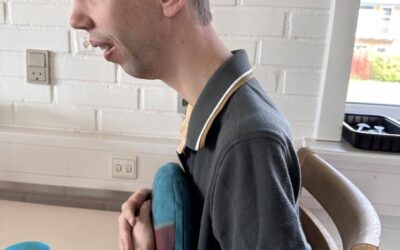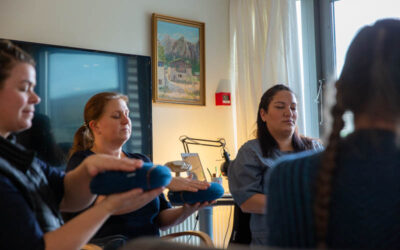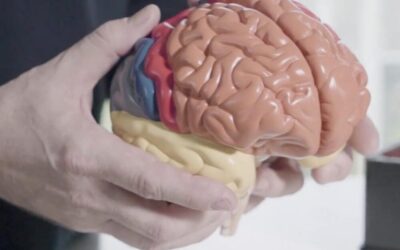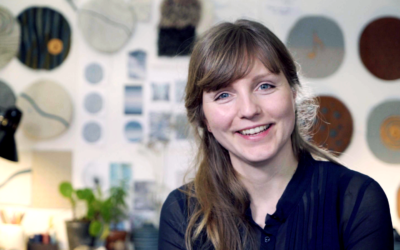The inmuRELAX calms, eases daily care and provides greater autonomy and wellbeing for people with dementia. That is the conclusion of a pilot project conducted on the use of the inmu in the professional care of people with dementia. 2/3 of the patients was reported to achieve a better quality of life during the study period.
Positive development
In two out of three people with dementia, the study showed positive results from using the inmu as part of daily care routines. It is an effect that, according to the participating care facilities, was expected to increase, had the project been allowed to continue for a longer period.
50 participants
The pilot project is based on data collected from 50 people with dementia living at eleven different Danish care facilities in ten municipalities over a period of four weeks.
That makes the pilot project one of the most comprehensive studies of the correlation between musical stimulation and dementia. It is notoriously difficult to conduct this kind of empirical study on the effectiveness of care tools on people with dementia, because the disease affects and progresses uniquely from person to person.
Goals
The main goal of the pilot project was to “investigate the basis and necessity for developing new tools and methods that are simple to implement into preventive nursing and social pedagogical care practices for people with dementia.”
Moreover, the pilot project investigated how easy the inmu was to implement into existing social pedagogical care methods, such as the “common third” and the “contact island”. “Common third” is a method that uses an object of interest to strengthen social interaction between two or more people who have trouble relating to each other.
Many people with dementia quickly get overstimulated by physical touch. “Contact Island” is the term for a daily recurring contact-promoting activity between resident (patient) and staff. It can also be an object that can be used as a “safe thing”, for example in daily care. When the “contact island” or the thing is being used, the person knows what is going to happen, e.g. dressing or undressing.
Music and dementia
The pilot project is a continuation of research gathered by Danish and international studies on the beneficial relationship between music and dementia.
One of the leading researchers on the effect of music on the brain is professor in musical therapy at Aalborg University, Denmark, Hanne Mette Ochsner Ridder. In her book Musik og Demens (2005), she describes the relationship between music and the brain:
“Music reduces agitated behaviour, anxiety, apathy, and depression, as well as raising cognitive and social skills and willingness to cooperate and share with others, when used in interdisciplinary contexts in relation to care situations or other forms of musical activities or treatments using musical therapy.”
Recommendations
The pilot project recommends that the inmu should be implemented over a longer period of time. During this period the care professionals should be personally involved in introducing the inmu into the specific daily care routines of the person with dementia.

Results
- Showed that 2/3 of participants achieved a better quality of life.
- Improves general wellbeing for people with dementia
- Eases daily care routines for people with dementia
- Minimises limitations in autonomy for people with dementia during daily care routines
- Minimises unrest and reduces the use of sedatives for people with dementia
- Improves night sleep and reduces the use of sleeping medication for people with dementia
- Decreases agitation, violence and threats of violence made against care professionals
“The inmu improves the feeling of safety, promotes liveliness, prevents fatigue during mealtimes, gives rest and ease, prevents conflicts during daily toilet visits, personal hygiene, dressing and undressing, eases transfer by patient lift, minimises the amount of repeated emergency calls, and improves night sleep. In the long term it can help to decrease the use of sleeping and sedative medication.”
Conclusion from the report
About
The pilot project, Musical Sensory Stimulation for People with Dementia, was conducted by social entrepreneur Marianne Saxtoft from Samskabelse. The study was completed in cooperation with inmutouch.com ApS.
Get inspired on how to use inmu in care
Care home has found a way to prevent stress for caregivers
At nursing home Lillevang, they have found an innovative way to prevent stress and reduce sickness absence. Like many...
read moreinmuRHYTHM stimulates during daily activities
Kasper is an active man who has autism and a rare muscle disease that causes him to tire quickly. He has no language...
read moreMindfulness with inmuRELAX improves well-being of nursing home employees
Lillevang nursing home focuses on the well-being for the staff. In the project "Life-giving breaks" they give the...
read moreGerman study: inmuRELAX had effect on 85% of the patients
A study by Pflegepraxiszentrum (PPZ) Nürnberg show big effect from inmuRELAX in care: more calm and peaceful patients...
read moreRead more
What is an inmu?
The inmu combines tactile and musical stimulation in a soft interactive cushion that …
Multisensory stimulation
Our senses are essential for us to feel alive, when meeting with others and …
Interactive music
The inmu is the first sensory stimulation tool in the world to …
Moving body and brain
We are all made to move. If you are not using your muscles for a short while …
Why music and sensory stimulation is medicine for the brain
Several studies shows that music can heal an injured brain …
The tactile experience of the inmuRELAX
We knew from the very beginning of the inmu development process that design should be an integrated part of the...
Studies
We have been so privileged that both healthcare professionals, scientists, …









